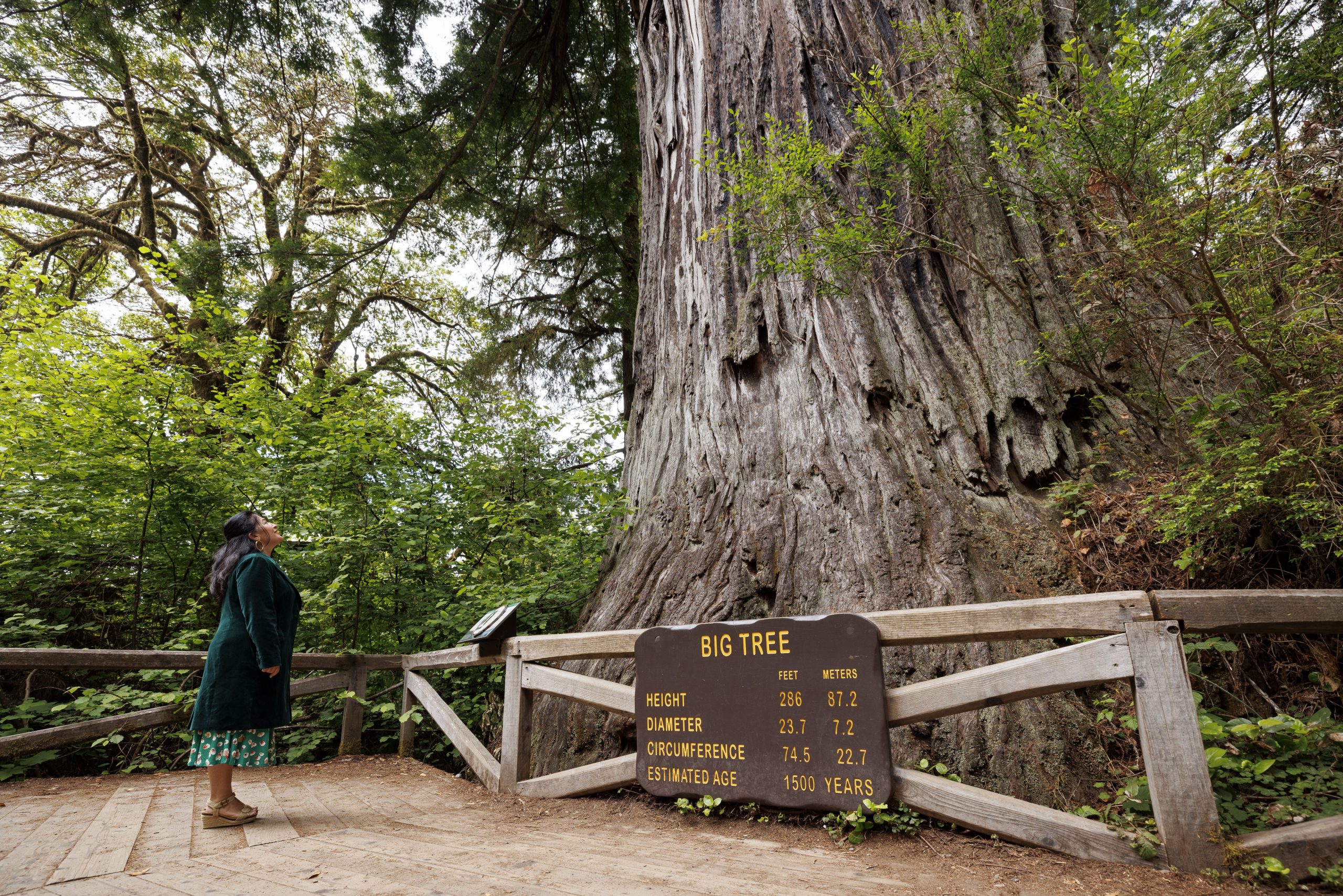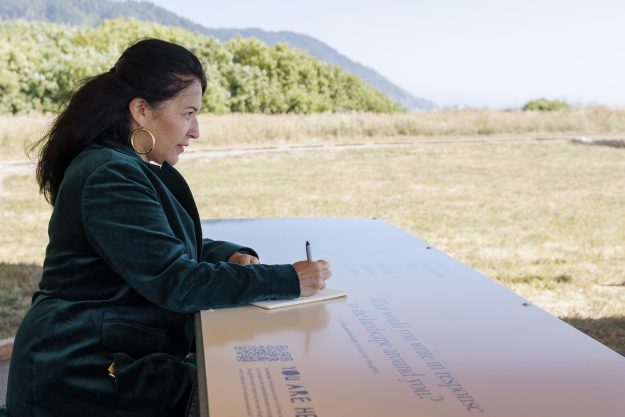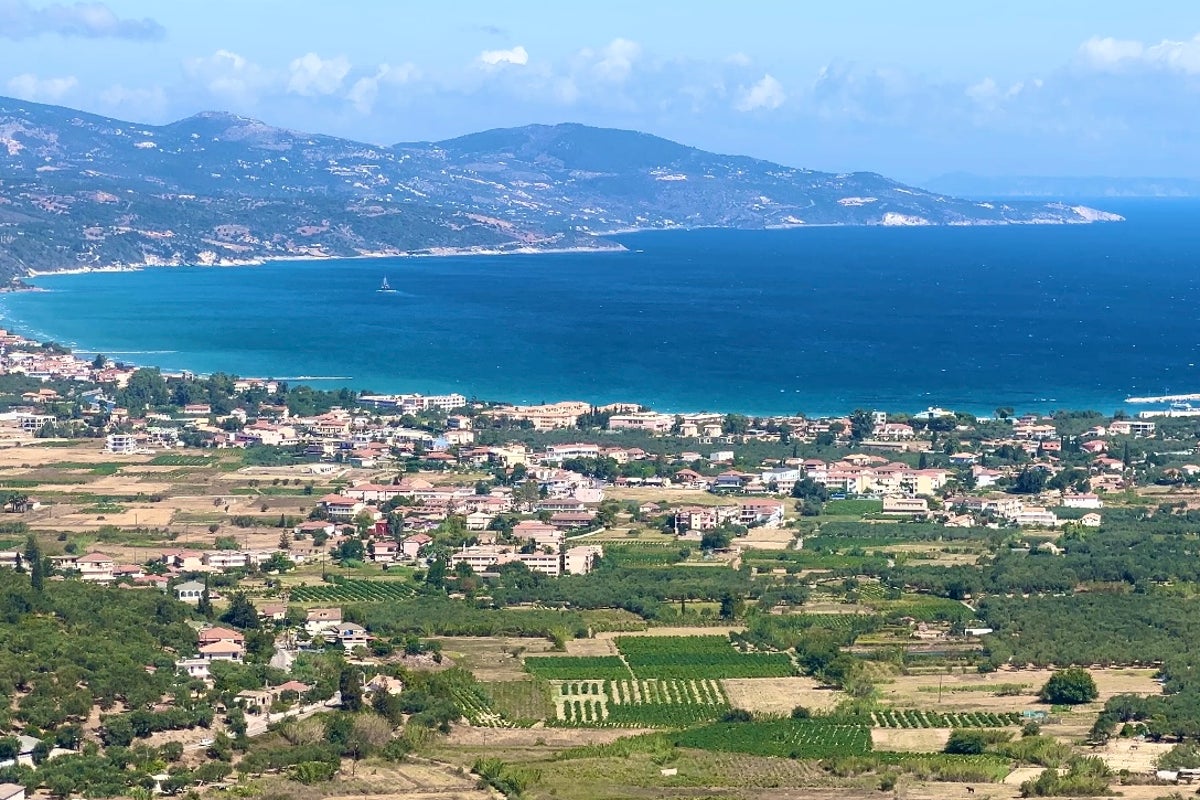Creatures of Constant Awe
US Poet Laureate Ada Limón discusses how writing can be an act of offering something back to the planet. The post Creatures of Constant Awe appeared first on Tricycle: The Buddhist Review.

Ada Limón is a firm believer in the power of poetry. In her role as the 24th Poet Laureate of the United States, she has undertaken a series of projects harnessing poetry to transform our relationship to the natural world, from installing poems on picnic benches in national parks to writing a poem that will be engraved on a spacecraft sent to the second moon of Jupiter. Her latest collection, You Are Here: Poetry in the Natural World, brings together poems by fifty of the nation’s most celebrated poets to challenge and reimagine our relationship to the world around us.
In all of these projects, Limón is guided by the view that poetry, much like meditative practice, can be an offering. “I’m interested in the way that as writers we can think of our work as offerings, as things that go out in the world and do work beyond us,” she told Tricycle. “When I think of loving-kindness as an offering that spirals outward, I think that poems can do that too.”
In a recent episode of Tricycle Talks, Tricycle’s editor-in-chief, James Shaheen, sat down with Limón to discuss her practice of loving-kindness and how it influences her writing, how poems can slow us down and return us to the present moment, and why she believes poetry can help us decenter our sense of self. Read an excerpt from the conversation below, and then listen to the full episode.
You open the introduction to You Are Here with a story about watching the trees, and you say that the trees make you feel at once more and less human. So what does it mean to feel both more and less human? My friend Dan is a fellow meditator, and one of the things he said to me once after meditating was, “I’m the least Dan I am when I meditate.” I think that’s true. Looking at trees makes me feel like I am no longer just myself but that I am part of something larger, and that part is very human and very animal at the same time. It’s also not the human that we think of. It’s not just the human being that has to go to appointments and check things off the list and pay bills and care for folks. It’s the human that can easily be connected to this larger ecosystem of the world. That feels very useful to me, because I can be in my body but also not feel like my body is the be-all and end-all, that there’s something beyond it.
You also write that poems are like trees in that they let us breathe together. How so? One of the ways that poetry is different from prose is that oftentimes it’s lineated, and even if it’s a prose poem and it’s not lineated, it works in a specific way with breath. When you read a poem out loud, whether it’s yours or someone else’s, that poem is allowing you to enter that person’s breath. The line breaks tell you when to breathe, when to pause. It’s not unlike music in that way. And so you actually enter someone else’s breath when you read their poem, and it’s a really intimate act to do that. I think that there’s beauty in that community aspect: If I am reading a poem you wrote, I am entering your breath.
In addition to the printed anthology, the project [You Are Here] also includes installations encouraging the public to pay deeper attention to their surroundings. Could you say more about this part of the project? What are your hopes for these installations? The poetic installations are oversized picnic tables that are elongated on one side so they can be accessible, so if you’re in a wheelchair, you can easily come to the picnic table and be part of the conversation. Because poetry allows you to slow down and because it has breath built into it, my hope is that the installations provide a moment of reflection where people entering these spaces can sit and witness the world and feel witnessed in a way.
The line breaks tell you when to breathe, when to pause. It’s not unlike music in that way. And so you actually enter someone else’s breath when you read their poem, and it’s a really intimate act to do that.
At the end of each poem there’s a prompt, which is “What would you write in response to the landscape around you?” You’ll note that I didn’t say “poem.” I think people can be intimidated by the word “poem.” And so it can be a sentence. It can also be a thought. You’re also welcome to write the poem and burn it in the burn pile, or you can write the poem in carrots or in leaves—whatever feels safest to you.
But my thought is to have people recognize that a poem can be an offering—that it can go back into the universe. Maybe what you want to write in response is “Thank you.” Maybe it’s “I’m sorry.” Maybe it’s “I’ll do better,” or maybe it’s “You brought me closer to my family member that I came here with,” or “You reminded me of something,” or “You reminded me of being alive and the beauty of this world.” It can be whatever it needs to be for you. I hope people will participate in whatever public or private way they want to.
What do you hope people will learn from trying to write poetry even if they don’t think of themselves as poets? I think that, first of all, trying to make anything is beautiful. Richard Hugo said that writing is a way of saying that you and the world have a chance. I think even putting pen to paper or fingers to keyboard is already a way of saying you and the world have a chance.
If you practice mindfulness, there’s a wonderful thing that can happen in the body when you work at really trying to describe what you are noticing in the world. You start to be curious about what it is that you want to describe: Why is it that you’re describing that? Why did you choose that? What does it remind you of in your own life? When I described a tree that’s half burned and half alive [in “Salvage”], that was me. And so it’s not only in what and how we describe, but why do we choose that? Being curious is such a good way to live.
You recently wrote a poem that will be released into space, “In Praise of Mystery: A Poem for Europa.” Could you tell us how that poem came about? I was asked by the folks at NASA to write an original poem that would be engraved on the Europa Clipper, which will travel 1.8 billion miles to the second moon of Jupiter called Europa, which is an icy moon that is primarily made of water. For years, scientists have posited that it has all the ingredients for life, and so they’re going up to test the plumes of water to see if it is indeed true that it might have all the ingredients for life.
 U.S. Poet Laureate Ada Limón sits to write after the unveiling of a poetry installation on a picnic table at Redwood National and State Parks on June 23. The initiative is called “You Are Here: Poetry in Parks” and is part of Limón’s signature project as poet laureate. Photo by Shawn Miller, Library of Congress.
U.S. Poet Laureate Ada Limón sits to write after the unveiling of a poetry installation on a picnic table at Redwood National and State Parks on June 23. The initiative is called “You Are Here: Poetry in Parks” and is part of Limón’s signature project as poet laureate. Photo by Shawn Miller, Library of Congress.For this exploratory mission, they asked me to create a poem that would be engraved on this spacecraft in my own handwriting. As you might imagine, it was a difficult prompt, and the thing that helped me the most was realizing that the poem had to point back to this planet, to this earth. And so as much as it’s a poem that reaches outward, it’s a poem that comes right back here and points inward to us here on this planet.
In that poem, you write that we are creatures of constant awe. So how can poetry inspire that awe? I think that poetry can open us up to a remembering: a remembering of awe, and a remembering of our curiosity. We all have it; we’ve just forgotten it. And so poetry is a way of remembering that at one point, the world fascinated us, and the world hasn’t changed. We just have to keep being fascinated by it.
*
In Praise of Mystery: A Poem for Europa
Arching under the night sky inky
with black expansiveness, we point
to the planets we know, we
pin quick wishes on stars. From earth,
we read the sky as if it is an unerring book
of the universe, expert and evident.
Still, there are mysteries below our sky:
the whale song, the songbird singing
its call in the bough of a wind-shaken tree.
We are creatures of constant awe,
curious at beauty, at leaf and blossom,
at grief and pleasure, sun and shadow.
And it is not darkness that unites us,
not the cold distance of space, but
the offering of water, each drop of rain,
each rivulet, each pulse, each vein.
O second moon, we, too, are made
of water, of vast and beckoning seas.
We, too, are made of wonders, of great
and ordinary loves, of small invisible worlds,
of a need to call out through the dark.
♦
“In Praise of Mystery” by Ada Limón was released at the Library of Congress on June 1, 2023 in celebration of the poem’s engraving on NASA’s Europa Clipper, scheduled to launch in October of 2024. Copyright Ada Limón, 2023. All rights reserved.

 Konoly
Konoly 































